Key takeaways:
- Define clear event goals, allowing emotional and experiential objectives to guide planning decisions and adapt over time.
- Create a structured budget that includes a contingency fund, prioritizes expenses, and maintains regular communication with vendors.
- Choose venues and vendors thoughtfully, ensuring their alignment with the event’s needs and fostering positive relationships for successful collaborations.
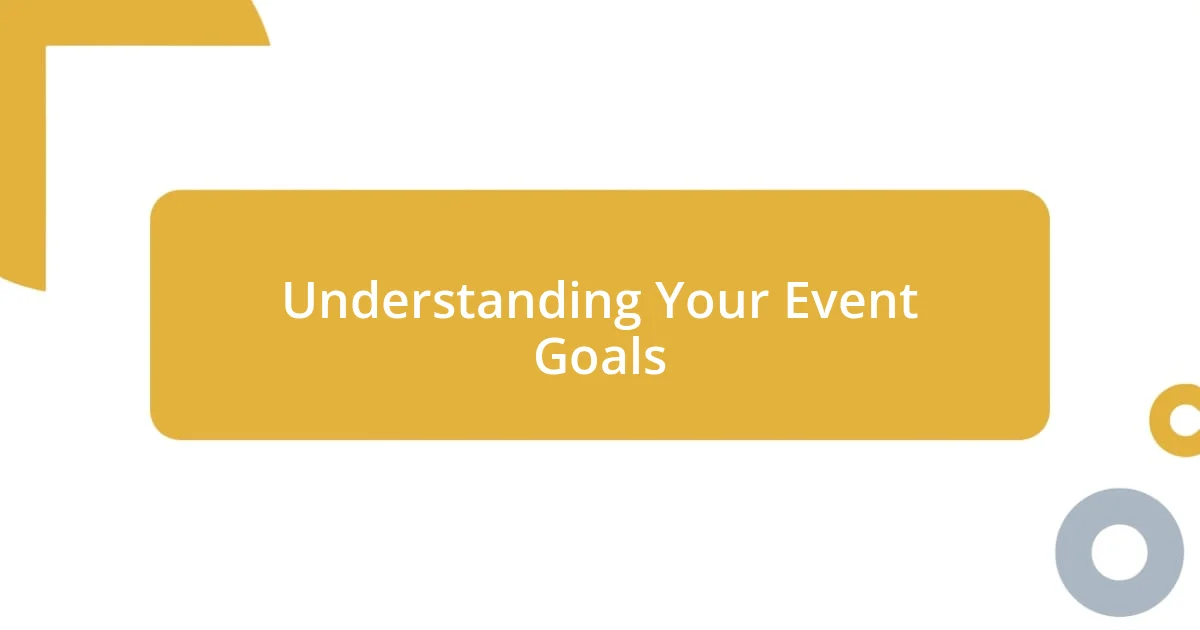
Understanding Your Event Goals
Understanding your event goals is the crucial first step in crafting a successful experience. When I planned my sister’s wedding, I remember sitting down with her to discuss what she really wanted. Were we targeting an intimate gathering or a grand celebration? Those conversations helped shape every decision we made.
It’s so easy to lose sight of what you want to achieve amidst the countless details. I often ask myself: What emotions are we aiming to evoke? Creating memories is essential. For instance, while planning a corporate retreat, I realized that fostering connection was more important than just the agenda. By pinpointing that emotional goal, I was able to design activities that truly engaged attendees.
Let’s not forget—the objectives can evolve. I’ve had events where the focus started on networking, only to reveal a deeper need for community building as the planning progressed. Have you considered how your goals might adapt over time? Recognizing this flexibility can lead to richer experiences than you initially envisioned.
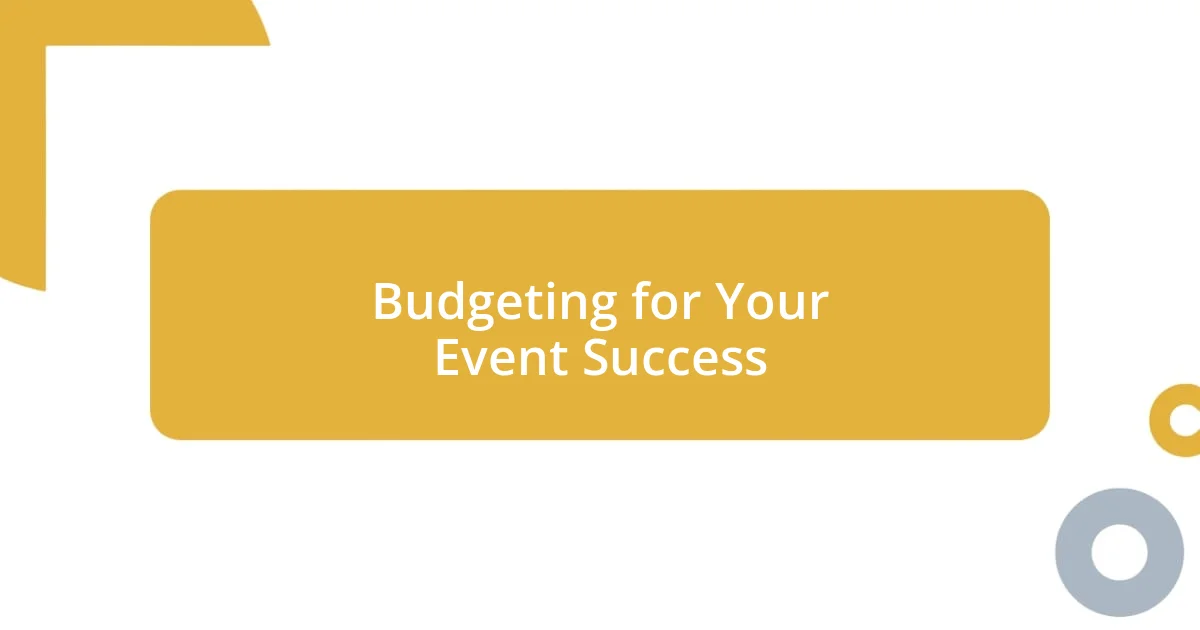
Budgeting for Your Event Success
Budgeting for an event can feel overwhelming at first, but I’ve learned that a well-structured plan can make all the difference. During my first major event, I underestimated costs and learned the hard way that unexpected expenses add up quickly. By creating a detailed budget ahead of time, I was able to allocate funds to crucial areas while keeping an eye on those potential surprises.
Here’s how I approach budgeting for success:
– List all potential expenses: Venue, catering, decorations, and entertainment should all be included.
– Prioritize: Rank items in order of importance; invest more in what aligns with your goals.
– Create a contingency fund: Setting aside about 10-20% of your budget for unexpected costs can save you stress later.
– Track every expense: Use a spreadsheet or budgeting app to monitor your spending in real time.
– Review and adjust regularly: I often revisit my budget as the event date approaches to ensure everything stays on track.
Finally, it’s important to keep open communication with vendors about your budget restrictions. I’ve found that being transparent can lead to creative solutions and great relationships, which often brings unexpected value to the event planning process.
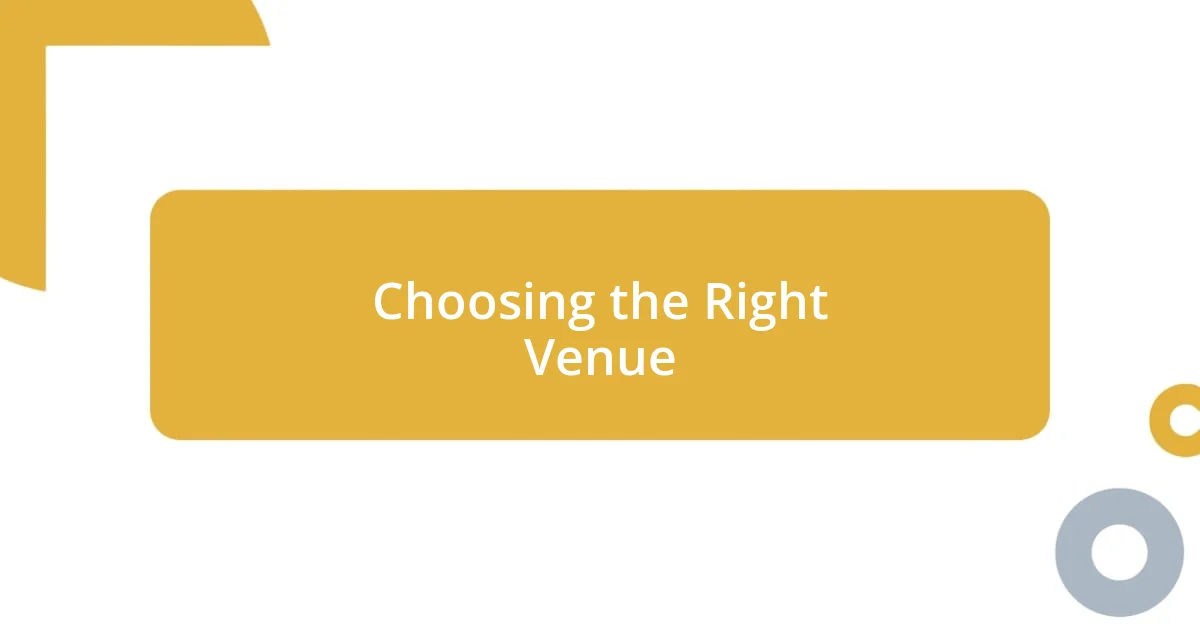
Choosing the Right Venue
Choosing the right venue can change the entire atmosphere of your event. I recall planning a milestone birthday for a friend and initially settled on a popular downtown space. However, upon visiting, I realized it lacked the cozy vibe we wanted. After some searching, we found a charming garden with twinkling lights. Transitioning to that more intimate venue transformed the celebration into a magical experience that guests still talk about.
It’s essential to consider the venue’s capacity, layout, and available amenities. I often create a checklist to compare venues based on these factors. When I organized a charity gala, I prioritized locations that could accommodate our desired layout for both dining and entertainment. I learned that an open floor plan allowed for a more engaging atmosphere, encouraging guests to mingle rather than remain seated. It’s critical to visualize how the space will serve your event’s flow.
Lastly, logistics are just as important as aesthetics. Is there enough parking? What about accessibility for attendees with disabilities? During a corporate event, I encountered unexpected challenges when a venue’s parking lot was too small, causing chaos. This experience taught me to always ask about such details upfront. It’s these behind-the-scenes considerations that can truly make or break your event.
| Factor | Consideration |
|---|---|
| Capacity | Ensure the venue can comfortably fit your expected number of guests. |
| Layout | Think about how the space will accommodate activities and flow. |
| Amenities | Check for essential services like AV equipment, catering options, and accessibility features. |
| Logistics | Evaluate parking, transportation options, and venue rules or restrictions. |
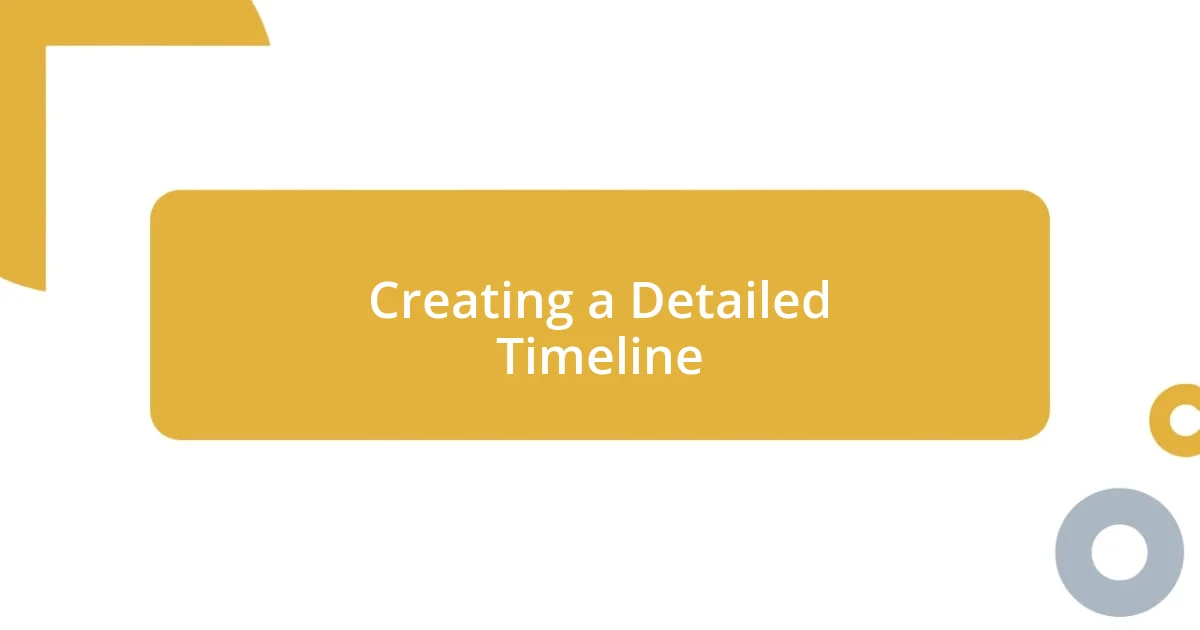
Creating a Detailed Timeline
Creating a detailed timeline is one of the aspects of event planning that I have come to cherish. Years ago, while organizing a friend’s wedding, I crafted my first timeline, and I was pleasantly surprised at how it anchored the entire planning process. I broke the timeline down month by month, then week by week, detailing every task from booking vendors to confirming RSVPs. That structure not only helped keep everyone accountable but also alleviated a lot of the stress I initially felt.
I can’t stress enough the power of time blocking. For example, I often allocate specific hours for activities like food tastings or floral arrangements. When I planned my own anniversary party, I made it a point to schedule ample time for each task. The result? I avoided the last-minute chaos that can creep up and inevitably lead to mistakes. How often have you left something important until the last minute and wished you had just a bit more time? By scheduling in buffers, I found I could breathe a little easier.
Another crucial piece of the puzzle is flexibility. Life often throws us curveballs, and I’ve experienced my share of unexpected changes. Once, a vendor postponed our meeting due to a family emergency. Thankfully, because my timeline included contingency plans, I quickly adjusted. I always remind myself—and others—that it’s okay if everything doesn’t go according to plan. The real art lies in how we adapt and keep the larger vision intact, ensuring that the event remains a joyful occasion for everyone involved.
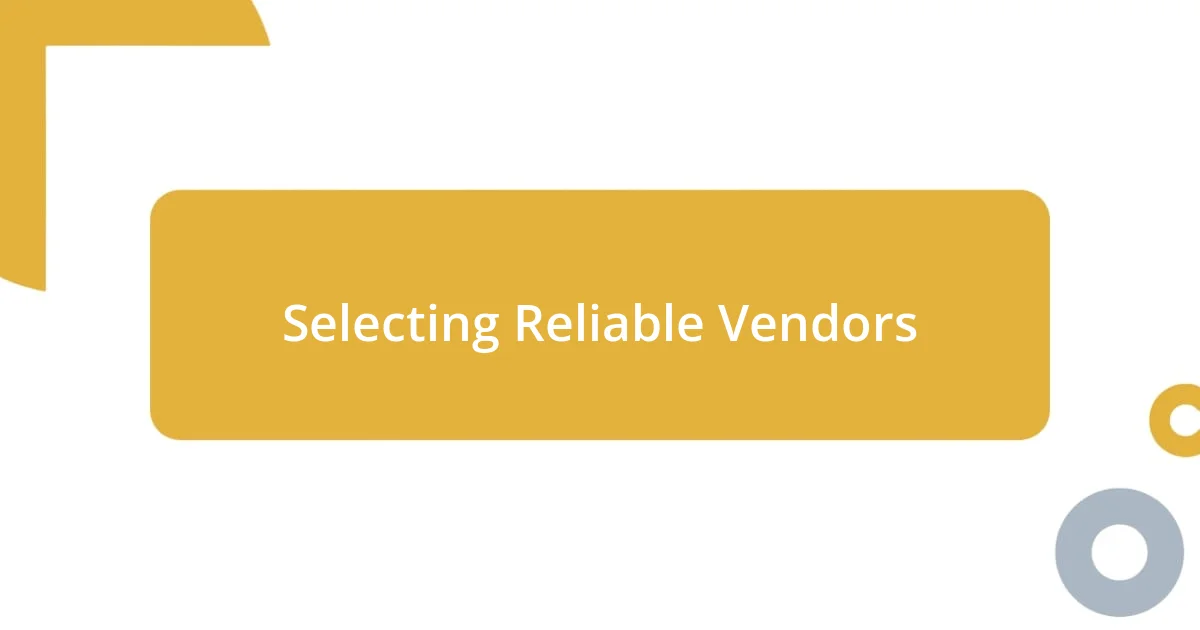
Selecting Reliable Vendors
Selecting reliable vendors can feel daunting, but it’s one of the most crucial steps in ensuring a successful event. I remember coordinating a local art fair where we relied heavily on vendors for everything from catering to entertainers. Initially, I went with the ones that had strong online reviews. However, I learned that not all reviews tell the full story. Meeting vendors in person often revealed more about their reliability and professionalism than any internet rating could.
As I sifted through potential vendors, asking the right questions became invaluable. For example, I always inquire about their experience with similar events. I once chose a florist who specialized in weddings, but when it came time for an outdoor corporate gathering, things didn’t go as planned. I quickly learned that compatibility with the event type matters just as much as experience. Have you ever picked someone who just didn’t quite understand what you needed? The right questions can save you from future headaches and ensure everyone is on the same page.
Trusting your gut feeling is essential too. There was a time when I met a potential DJ who had all the credentials but lacked the enthusiasm. Despite rave reviews, the energy he exuded during our meeting didn’t sit right with me. In the end, I chose a different DJ who may not have had the longest resume but brought a vibrant spirit to discussions. I’ve found that a solid connection with vendors can contribute significantly to a successful collaboration. So, when you feel that spark—or lack thereof—pay attention; it can make a world of difference.
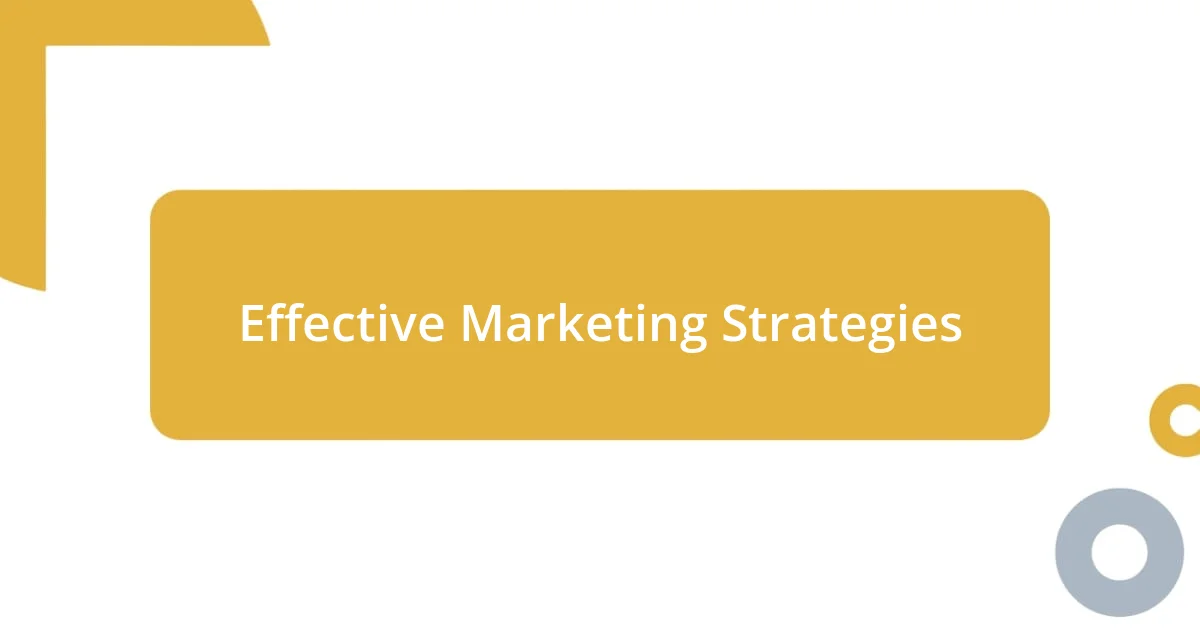
Effective Marketing Strategies
Effective Marketing Strategies
Marketing an event effectively is like crafting a narrative that draws potential attendees in. During a community festival I organized, I decided to use storytelling in our promotions. We highlighted local artists and their contributions, pulling at the heartstrings of residents who felt a connection to those stories. How powerful is it when people see their own community reflected in an event? The result was a significant uptick in ticket sales, affirming to me that stories resonate far more than plain facts ever could.
Another strategy I’ve found invaluable is leveraging social media. I remember a corporate gala where we used behind-the-scenes footage leading up to the event. It created a buzz that not only built anticipation but also sparked conversations. When people feel like a part of the journey, they’re more inclined to share it. After all, who doesn’t enjoy a sneak peek or being involved in something exciting? This interactive approach transformed our audience from passive observers to active participants.
Finally, don’t underestimate the power of partnerships. Collaborating with local businesses can vastly extend your reach. I once partnered with a well-known café to sponsor a local charity event, and they promoted it to their loyal customer base. It was a win-win! Have you ever thought about how much utilizing existing networks can amplify your event’s visibility? Building these relationships can also create a sense of community and support that attendees will appreciate. The more connections you make, the broader your marketing impact can be.














